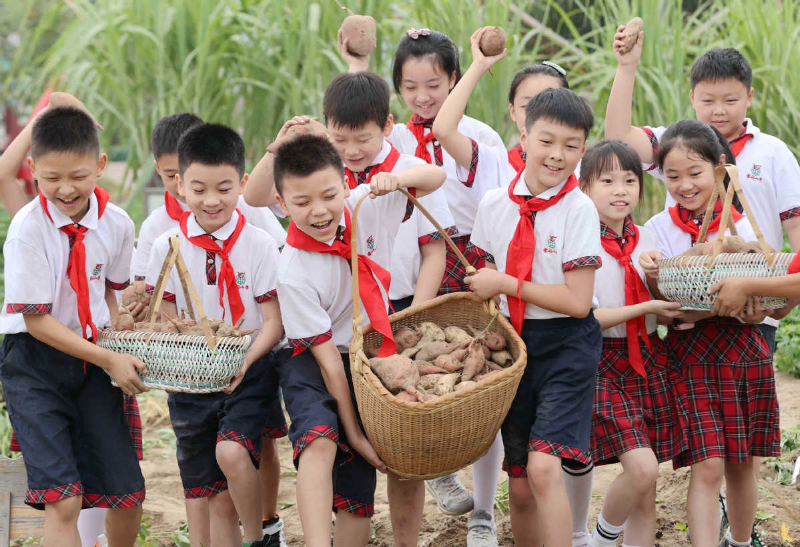New Courses Make Students Appreciate Value of Hard Work

Students harvest sweet potatoes during their first class of the new semester in Huzhou, Zhejiang province, on Thursday. They gathered sugar cane and watered vegetables as they learned about the importance of hard work in farming. XIE SHANGGUO/FOR CHINA DAILY
Sessions on practical skills to help cultivate perseverance, teamwork
When primary and secondary school students started the new school year on Thursday, many would have noticed a new course in their curriculum focusing on practical skills, such as housekeeping and cooking.
The new course was introduced after the Ministry of Education released a new curriculum standard for labor education in compulsory education.
The standard has three types of tasks: Everyday chores such as cleaning, organizing and cooking; agricultural or manufacturing labor like growing vegetables and making handicrafts; and service such as volunteer work.
Song Xiaoning, mother of a first grader in Beijing, said she looks forward to what her daughter will learn at the new once-a-week labor course.
“I think it is very important for her to have a labor course at school as she can learn to appreciate manual labor and the hardworking spirit,” she said. “She very much relies on us and her teachers, and I want her to learn how to do things by herself and become more independent.”
At Zhenjiang Zhongshan Road Primary School in Jiangsu province, the first lesson for the new school year on Thursday was to check on the vegetables that are growing in the school garden, said Liu Peipei, principal of the school.
In the past, students at the school have learned how to prepare some cold dishes in the canteen, and with the help of parents, some were able to cook more sophisticated dishes, such as fried chicken and even make mooncakes, she added.
Hao Yufang, vice-principal of Chunguang Primary School in Handan, Hebei province, said since labor courses started last semester, they have become the favorite subject for many students.
Depending on the age of the students, they learn different practical skills, such as cleaning, organizing, gardening and cooking, she said.
To make the courses more interesting, the school has organized a clothes folding competition for first and second graders, a garlic peeling competition for third and fourth graders and cold dish competition for fifth and sixth graders, she said.
First graders are also required to clean the classroom by themselves. Although they might not know how to do it well and teachers often need to do the cleaning again afterward, the important thing is for them to know that manual labor is important for their growth, she added.
Cui Shifeng, principal of Hefei Hupo Mingcheng Primary School in Anhui province, said labor courses can teach students to respect labor and know that labor can create happiness.
The school has organized students to visit farming bases to teach them the whole process of rice growing, he said. With the guidance of teachers and professionals, they have learned everything from sowing to reaping rice, Cui said.
They have also gone to communities near the school to collect garbage and help elderly people do household chores, he said.
“Labor courses cannot be easy or superficial. Students need to make real efforts and sweat when taking labor courses, so they can really cultivate virtues of strong willpower, perseverance and teamwork,” he added.
https://www.wuhu.gov.cn/English/News/35629791.html
